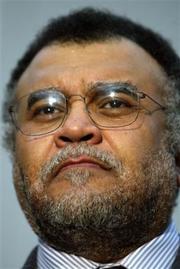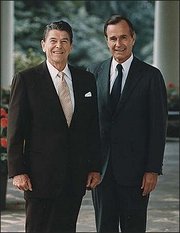
The greatest American crime of the 20th century was the selling-out of our interests to Saudi Arabia. (The picture of Saudi Prince Bandar is from Cox Enterprises.)
It happened gradually. The Texas oilmen who helped found Aramco in the 1930s thought they could control the Saudi monarchy. This changed after the 1973 oil shock and rather than doing something about it, as President Carter wanted, we went the other way. We have been engaged in Middle East wars ever since, generally acting as a proxy for the Saudi army.
Look at what we have done.
Support for the Saudi Mujahaddin in the 1980s. Support for Iraq in the Iran-Iraq War during the same period. A war to liberate a monarchy in 1990. The invasion of Iraq itself, eliminating the invader from the scene. All these acts, and countless smaller ones, furthered the interests of the Saudi monarchy, which combines the absolutism of Louis XIV with the religious brutality of Torquemada. The only way to rationalize Bush policy, which supports religious extremists at home and abroad, which treats our own people as disposable, is to point to Saudi influence.
But this is not something we can nuke ourselves out of. Force of arms just digs the hole deeper. Whether or not peak oil is real isn’t the issue either. This is an economic battle we’re now in, one for our national interest as well as our planet, and it can only be engaged in through the mechanisms of business. These include research, finance, entrepreneurship, and incentives.
At the heart of our great mistake was the fall in oil prices starting
in 1981. Prince Bandar played Reagan and Bush the same way Bill Gates played IBM later in the decade, and the economic results were similar. The players got rich and the played got short-term gains.
The Reagan oil cut had two impacts. First it undercut the nascent
market in renewables, and second it placed American security squarely in the
hands of oil producers. Those cuts have been mostly reversed in the
last few years, but on an inflation-adjusted basis we’re still below
where we were then. More important, there is every chance that oil
prices could fall tomorrow, that they could go under $50 for an
extended period of time. Once that happens, any investment you have in
renewables dries up — we’re back to zero again.
Thus, the War Against Oil becomes the heart of our national security
policy. Once you commit to a War Against Oil, then increases in the
price of oil stimulate new investment. We can and should manage a floor
price for hydrocarbons, just as we once maintained corn and soybean
prices, in order to assure a profitable market for the producers of
alternative, renewable, American energy.
Managing the floor price means, first, finding a price that is
consistent with moderate economic growth, managing the price upward slowly, and
capturing the difference between what the market is paying and the
floor in the form of taxes. This is not communism, or socialism, or any
other ism. It’s just what the Texas Railroad Commission did on behalf
of oil producers in the 1950s. They did it to assure a steady stream of
cash for oilmen. We should do it to supply a steady stream of capital
to those engaged in renewables.
There is a lot to do. We can dramatically increase the efficiency of
solar cells and solar panels. We can dramatically increase the
efficiency of our current electric grid. We can dramatically improve
insulation in our homes, offices and warehouses. We can get more miles
from each gallon of gas. We can dramatically increase our use of wind
power. We can use geothermal energy technology to turn our earthquake
zones into hydrogen exporters.
These are technical problems, but more important they are business opportunities. They
are opportunities we should have been pursuing for a generation now,
opportunities that were lost when we sold our economic souls to the Saudis.
I don’t hate or dislike the Saudi family. They are acting in their
rational self-interest. We should be acting in our rational
self-interest as well. Starting now.











